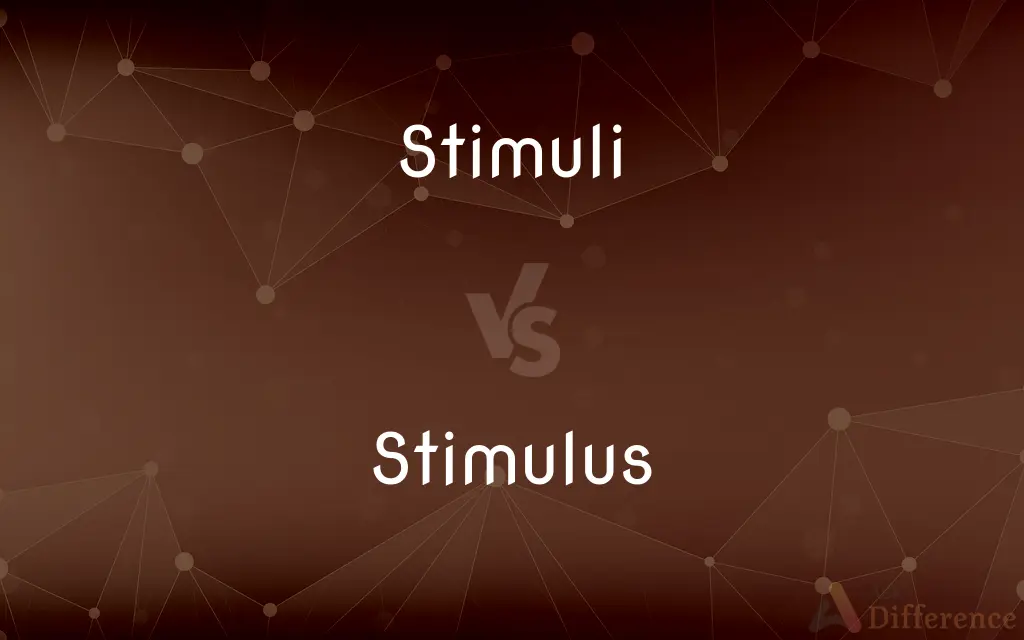Stimuli vs. Stimulus — What's the Difference?
By Maham Liaqat & Urooj Arif — Published on September 22, 2024
A stimulus is a single factor that prompts a response or reaction in an organism or system, whereas stimuli are multiple factors or events that elicit responses.

Difference Between Stimuli and Stimulus
Table of Contents
ADVERTISEMENT
Key Differences
A stimulus can be anything from a physical event to a chemical interaction that causes a reaction in an organism, system, or process. For instance, a sudden sound is a stimulus that might provoke an immediate response. On the other hand, stimuli refer to more than one of these factors, such as a combination of light, sound, and temperature changes, all working together to elicit a complex response.
In biological contexts, a stimulus might specifically refer to an external factor that influences a sensory organ, leading to a physiological response. For example, a bright light shining in the eyes is a stimulus that causes the pupils to contract. Conversely, stimuli encompass various sensory inputs, like smells, sounds, and sights, that collectively can affect behavior or physiological states.
In psychology, a stimulus could be a single event or object that elicits a behavioral or emotional response, such as a loud noise causing fear. Meanwhile, stimuli might include a range of different events or conditions that together influence an individual's mental state or reactions, demonstrating the complexity of human responses to their environment.
In economic or environmental research, a stimulus might refer to a singular factor or event that influences a system, like a policy change or a natural disaster. Stimuli, in this context, would imply multiple such factors or events that might together lead to more significant or varied effects on the system being studied.
Stimulus and stimuli also play a role in education and learning theories, where a stimulus might be a particular piece of information or a teaching method that facilitates learning. In contrast, stimuli could encompass a variety of educational materials and methods that together create a rich learning environment.
ADVERTISEMENT
Comparison Chart
Definition
A single factor that elicits a response
Multiple factors that elicit responses
Contexts
Used in various fields like biology, psychology, and economics
Applies in similar contexts but refers to multiple instances
Examples
A sudden loud noise
A combination of visual, auditory, and tactile inputs
Responses
Can cause a specific, localized response
May lead to complex or combined responses
Application
Often discussed in the study of cause and effect
Used when examining the effects of multiple variables
Compare with Definitions
Stimuli
Things that collectively rouse energy or activity.
The combination of fiscal policies and technological innovations served as stimuli for the industry's rapid growth.
Stimulus
Anything that prompts a response in an organism or system.
The sound of the alarm served as a stimulus for the workers to begin evacuation.
Stimuli
Various factors or conditions that collectively prompt responses.
The stimuli present in the new environment included different scents and sounds, intriguing the researchers.
Stimulus
A change in the environment that affects the activity of an organism.
Light is a stimulus that triggers photosynthesis in plants.
Stimuli
Events or conditions that evoke specific reactions in organs or tissues.
The experiment tested how various tactile stimuli would affect reflex actions.
Stimulus
An event or condition that evokes a specific functional reaction in an organ or tissue.
A tactile stimulus on the skin can provoke a reflex action.
Stimuli
Agents, actions, or conditions that together elicit or accelerate responses.
A blend of visual and auditory stimuli was used to study cognitive responses in the experiment.
Stimulus
A thing that rouses energy or activity in something else.
The government's tax cut was intended as a stimulus to economic growth.
Stimuli
Multiple changes in the environment affecting an organism's activity.
Plants respond to stimuli such as light, water, and gravity.
Stimulus
An agent, action, or condition that elicits or accelerates a physiological or psychological activity or response.
Certain music can act as a stimulus to enhance concentration.
Stimuli
Something causing or regarded as causing a response.
Stimulus
Something causing or regarded as causing a response.
Stimuli
An agent, action, or condition that elicits or accelerates a physiological or psychological activity or response.
Stimulus
Something that incites or rouses to action; an incentive
"Works which were in themselves poor have often proved a stimulus to the imagination" (W.H. Auden).
Stimuli
Something that incites or rouses to action; an incentive
"Works which were in themselves poor have often proved a stimulus to the imagination" (W.H. Auden).
Stimulus
An external phenomenon that has an influence on a system, by triggering or modifying an internal phenomenon; for example, a spur or incentive that drives a person to take action or change behaviour.
An economic stimulus
Stimuli
Government spending designed to generate or increase economic activity.
Stimulus
Something external that elicits or influences a physiological or psychological activity or response, or that affects any of the sensory apparatuses.
Stimulus
That which excites or produces a temporary increase of vital action, either in the whole organism or in any of its parts; especially (Physiol.), any substance or agent capable of evoking the activity of a nerve or irritable muscle, or capable of producing an impression upon a sensory organ or more particularly upon its specific end organ.
Stimulus
Any stimulating information or event; acts to arouse action
Common Curiosities
What makes a good stimulus in a psychological experiment?
A good stimulus in psychology is clear, measurable, and capable of eliciting a consistent response, allowing for accurate observations and conclusions.
How do plants respond to stimuli?
Plants respond to stimuli through various mechanisms like phototropism (response to light), gravitropism (response to gravity), and thigmotropism (response to touch), among others.
Can stimuli be internal?
Yes, stimuli can be internal, such as hormonal changes, emotional states, or pain, which can provoke internal physiological or psychological responses.
Are all stimuli physical?
No, stimuli can be physical, such as temperature or sound, but they can also be psychological or emotional, like receiving praise or encountering a stressful event.
Can a stimulus be negative?
Yes, a stimulus can be negative, such as a painful sensation or an unpleasant sound, leading to avoidance behaviors or negative emotional responses.
What role do stimuli play in habituation?
In habituation, repeated exposure to the same stimuli can lead to a decrease in response, as the organism learns that the stimuli pose no significant threat or reward.
How do humans respond to multiple stimuli?
Humans can process multiple stimuli simultaneously, but factors like attention, the intensity of stimuli, and individual differences can affect the prioritization and response to these stimuli.
Can the absence of stimuli be significant?
Yes, the absence of expected stimuli can be significant, leading to responses such as searching behavior or increased sensitivity to other stimuli.
How do stimuli differ in a controlled experiment vs. a natural setting?
In controlled experiments, stimuli are carefully selected, measured, and presented, whereas in natural settings, stimuli are more variable and less predictable.
Can stimuli be artificially created?
Yes, stimuli can be artificially created, such as in experiments or therapeutic settings, to study responses or to train specific reactions.
How do stimuli affect learning?
Stimuli can significantly impact learning by capturing attention, enhancing memory retention, and facilitating the association between new information and existing knowledge.
How do animals detect stimuli?
Animals detect stimuli through sensory organs that are adapted to respond to specific types of external or internal changes, like eyes for light, ears for sound, and skin for touch.
How do cultural factors influence response to stimuli?
Cultural factors can influence how individuals perceive, interpret, and respond to stimuli, as cultural norms and experiences shape sensory preferences and reactions.
Are stimuli always external?
While many stimuli are external, originating from the environment, internal stimuli also play a crucial role, originating from within the organism's body.
How does sensory adaptation relate to stimuli?
Sensory adaptation refers to the adjustment of sensory receptors to continuous stimuli, leading to decreased sensitivity and response over time.
Share Your Discovery

Previous Comparison
Human Centered Design vs. User Centered Design
Next Comparison
Chamilia Bracelet vs. Pandora BraceletAuthor Spotlight
Written by
Maham LiaqatCo-written by
Urooj ArifUrooj is a skilled content writer at Ask Difference, known for her exceptional ability to simplify complex topics into engaging and informative content. With a passion for research and a flair for clear, concise writing, she consistently delivers articles that resonate with our diverse audience.










































